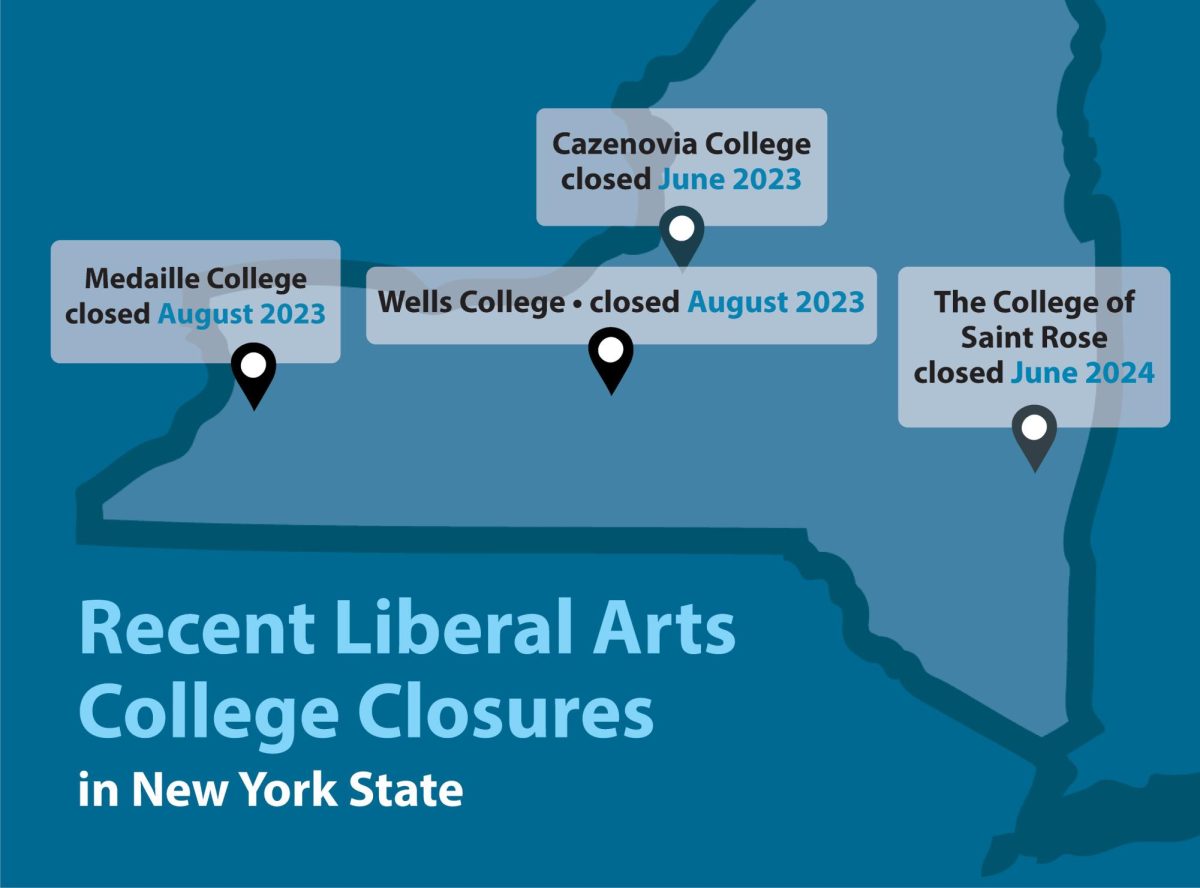Wells College — located in Aurora, New York — announced its closure in May. It was one of the many institutions that did so in a recent wave of college closures across the U.S. Amid this uncertain phase in higher education, Ithaca College is providing support to Wells students.
Ithaca College has partnered with the former college to provide a simple transfer process. In Fall 2024, the college is supporting 13 former Wells students through a teach-out plan.
A teach-out plan is when an institution that has lost its accreditation — and must close — makes an agreement with another accredited institution to ensure that students attending the closing institution can complete their degrees from another. Ithaca College is one of the 24 teach-out institutions Wells College partnered with.
Under the teach-out program, the college matched net costs — which encompasses tuition, housing and meal plans — that students had at Wells College. Ithaca College also transferred all coursework completed by students at Wells and provided on-campus housing to students if they choose to live on campus.
Nicole Eversley Bradwell, executive director of Admissions, said that because Wells closed at a time when transfer applications had closed, the college extended deadlines for former students and got rid of application costs.
Ithaca College senior Bailey Hamm transferred from Wells after its closure and said that she has felt very supported by the college in this transition.
“[Ithaca College] green-lighted me to [have] all of my credits transfer, and I don’t have to retake any classes,” Hamm said. “All of the professors have been very kind and understanding. I mean, honestly, the [transition] process has been very smooth, which has been nice.”
The financial cost of supporting former students
Ithaca College is supporting the 13 former Wells students without impacting its deficit. A deficit is when the college’s total expenses are greater than its total revenue. For the 2025 fiscal year, the college has a budget deficit of $9.2 million.
Tim Downs, vice president of Finance and Administration and chief financial officer, said that because there are only 13 former Wells students who transferred to Ithaca College, there are no significant added costs that need to be budgeted for their enrollment.
“We’re not hiring more staff to account for that — 200 students may have been a different story,” Downs said. “It’s actually going to be a pickup for us on the room and board side because our enrollment is down, we have capacity in our dorms, so we are actually able to fill them in our dorms again without having to take on additional costs. So, that is not a budget hit to us.”
Downs said the college has a pool of institutional funds from which financial aid is distributed. As long as the financial aid given to these students fits within the budget line of this funding pool, he said it does not impact the deficit the college is in.
Shana Gore, associate vice president of enrollment operations and student success, said the financial aid provided to former Wells students comes from these institutional funds like revenue, endowed scholarship and donations.
Gore said students transferring from Wells College were eligible to receive the same financial aid that any Ithaca College student might have been eligible to receive.
“There’s not any specific [financial aid] for Wells students, because they are [now] Ithaca College students,” Gore said. “And again, that’s looking at all of the different sources of financial aid available and helping them identify the different types of scholarships, grants, loans and work study for which they are eligible.”
Hamm said that Ithaca College was able to match her cost of attendance while she was at Wells.
“Everything was matched,” Hamm said. “And they were very responsive. When I was emailing them all of my questions over the summer, being like, ‘Please help me. I don’t know what to do,’ they were very kind.”
The recent wave of college closures
Bradwell said college closures will continue and Ithaca College wants to provide space for students who have to deal with the aftermath.
“Wells, unfortunately, wasn’t the first, and likely will not be the last — in terms of institutions that we work with — where students have come to us from those institutions,” Bradwell said. “[Wells College was] a school within our community. … Everyone really wanted to provide an opportunity for students to move from Wells to Ithaca [as] seamlessly as possible.”
The influx of these closures is because of financial strain as a result of low enrollment placed on these colleges following the COVID-19 pandemic. At the All-College Welcome that was held Aug. 27, Downs said this year, new student enrollment at Ithaca College was 200 below the target.
According to The Hechinger Report, on average, one college or university per week has announced its closure or merger with another institution so far in 2024. Institutions in New York State like Cazenovia College, Medaille University, the College of Saint Rose and Wells College all announced their closures in 2024.
Hamm said that whether a school believes that they are going to close or not, they should always have a safety net to ensure that students are supported in case a closure does happen.
“Small liberal arts colleges are always going to be a risky choice, and especially now when we’ve seen so many other schools close,” Hamm said. “Even if you don’t think you’re going to close. It’s silly not to have a backup [plan]. I think teach-outs are good, and that colleges should have plans for how to protect and support their students. And I definitely felt protected and supported in terms of how my experience has been transferring to IC.”
Robert Kelchen, professor and department head of Educational Leadership and Policy Studies at the University of Tennessee, Knoxville, said that two big signs that a college might close are a drop in enrollment and continuous loss of money each year.
“The first big indicator [of a closure] is just consistently losing money, and that’s something that you can see in the financial statements,” Kelchen said.
Kelchen said once a college starts losing money, it can soon reach a point where the situation might worsen.
“Another issue and this is often the tipping point: they just run out of available cash on hand,” Kelchen said. “They may, on paper, have assets, but if the assets are all buildings unless they can sell a campus, it’s difficult to actually use that asset.”
Bradwell said that the proximity between the two colleges at a time like this in higher education was key to Ithaca College’s endeavor to support former Wells students.
“There was already a relationship there, and many of us care deeply,” Bradwell said. “Not only for Wells College, but of course, the Wells College community [as well].”
















